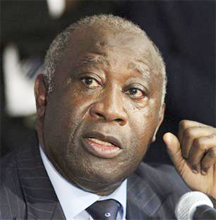ABIDJAN (Reuters) – Forces loyal to Ivory Coast presidential claimant Alassane Ouattara launched a heavy attack yesterday on the bunk-er where Laurent Gbagbo is holed up but appeared to have been repelled, a Western military source said.
Fighting raged for a third consecutive day in the economic capital Abidjan as Ouattara’s forces tried to unseat Gbagbo, who has refused to cede power after losing a November election to Ouattara, according to UN-certified results.
The source, who lives near Gbagbo’s heavily guarded residence in Abidjan, said fighting had died down in the afternoon and Ouattara’s forces had regrouped.
“As I understand it, they tried to take Gbagbo’s residence this morning. The assault failed,” said the source, speaking on condition of anonymity.
“They could not break through the resistance from all the heavy weapons still hidden around Gbagbo’s residence. They pulled back to rethink and replan.”

A spokeswoman for Ouattara denied that his forces had retreated but could not provide any details about their offensive and could not say whether fighting continued.
Residents earlier reported gunfire from heavy weapons around the residence, which is defended by youth militias and Gbagbo’s presidential guard.
“The fighting is terrible here, the explosions are so heavy my building is shaking,” resident Alfred Kouassi told Reuters. “We can hear automatic gunfire and also the thud of heavy weapons. There’s shooting all over the place. Cars are speeding in all directions and so are the fighters,” he said.
Later in the day, sustained machinegun fire rang out for about 30 minutes in Abidjan’s central business district near the presidential palace, site of some of the heaviest fighting in recent days, while pro-Ouattara forces circulated in the area in pickups, a Reuters witness said.
The French military said their troops were not involved in the attack on Gbagbo’s residence, unlike earlier in the week when French and UN helicopter air strikes backed the rebels’ advance into Abidjan.
Fighting resumed early on Wednesday after negotiations led by the United Nations and France to secure Gbagbo’s departure failed, French Foreign Minister Alain Juppe said.
“The negotiations, which were carried out for hours yesterday between the entourage of Laurent Gbagbo and Ivorian authorities, have failed because of Gbagbo’s intransigence,” Juppe told parliament in Paris.
The former colonial power in Ivory Coast, France has taken a leading role in talks to persuade Gbagbo to hand over to Ouattara and end a four-month standoff over the contested election in November.
A UN spokesman in New York said negotiations with Gbagbo’s camp were continuing, but it was not clear if they would lead anywhere, especially as Gbagbo himself told French radio he had no intention of stepping down.
“Just like in Libya, it’s going to take both the rebels and outside forces to push Gbagbo out,” said Sebastian Spio-Garbrah, analyst at DaMina Advisors in New York.
Ouattara’s forces earlier had tried to storm Gbagbo’s residence, but locals said Gbagbo’s militiamen put up a stiff resistance, even as most soldiers from the regular army had heeded a call to lay down their arms.
Despite the fighting, desperate civilians in the north of the city ventured outside to hunt for water and food.
“We haven’t slept, we haven’t eaten, we’ve had nothing to drink. We are all going to die,” 17-year-old Mariam said.
The International Commit-tee of the Red Cross said hospitals were overwhelmed, wounded were arriving “by any means possible,“ medical supplies were lacking and health personnel sometimes had to work without running water and electricity.
Gbagbo has ruled Ivory Coast since 2000. Negotiations to persuade him to quit stalled after he resisted international pressure to sign a document renouncing his claim to power.
“If Gbagbo has refused to sign the documents they (the UN and France) presented to him yesterday, it is because they proposed something that had no legal and judicial basis,” Gbagbo’s spokesman Ahoua Don Mello told Reuters on Wednesday.
He later said that Gbagbo wanted a ceasefire and direct talks with his rival Ouattara.
A defiant Gbagbo, who has refused to recognise Ouattara’s victory in the November presidential polls, had earlier denied reports he was ready to surrender.




